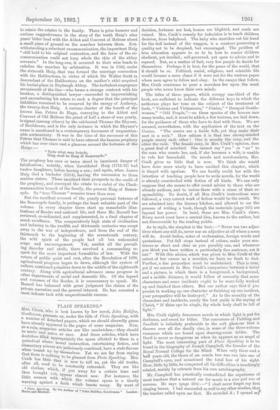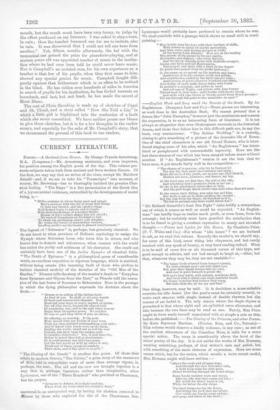PLAIN SPEAKING.*
MRS. CRAM, who is best known by her novel, him Ilallfax, Gentleman, presents us, under the title of Plain Speaking, with unmber of detached papers, which we should shrewdly guess have already appeared in the pages of some magazine. Now, as a rule, magazine articles are like sandwiches,—they should be made and eaten at once. And these articles, which have doubtless filled appropriately the space allotted to them in a periodical where moral instruction, entertaining fiction, and elementary science are judiciously combined, have a stale flavour when bound up by themselves. Yet we are far from saying that there is nothing to be gleamed from Plain Speaking. Mrs. Craik has little that is new to tell us, yet the old truths, after all, need to be constantly reiterated. They are like old clothes, which, if put away for a certain time and
then brought out, appear almost new, For instance, the little sermon with which the volume opens is a timely warning against a fault which be many. By rant of
" Plain Speaking. By the Author of "John Halifax, fientleutan." Loudon : Hurst and Blaokett,
decision, fortunes are lost, homes are blighted, and souls are ruined. Mrs. Oraik's remedy for indecision is to teach children decision, from babyhood. The baby who stretches out his hand for the doll instead of the waggon, is a creature possessing a quality not to be despised, but encouraged. The problem of true education appears to us to be how to render children obedient, yet decided; self-governed, yet open to advice and to reproof. But, as a matter of fact, very few people do decide for themselves. Perhaps it is best, for the peace of the world, that it should be so. Political, social, religious, and scientific life would become a mere chaos if it were not for the various popes whom men agree to follow and obey. In the essays that follow, Mrs. Craik continues to pour a merciless fire upon the weak people who never know their own minds.
The titles of these papers, which occupy one-third of the book, are sufficient to indicate the different keys in which the authoress plays her tune on the subject of the treatment of fools, Victims and Victimizers," " Conies," " Decayed Gentle- women," "Odd People,"—on these species of the human race many truths, and, it must be added, a few truisms, are laid down, for the guidance of those who have to deal with them. We are amused, nevertheless, with the application of the text on the Conies. "The conies are a feeble folk, yet they make their nest in a rock." How seldom it is that two strong-minded people marry each other One is usually the cony, and the other the rock. The female cony, in Mrs. Craik's opinion, does a great deal of mischief. She cannot say " yes " or " no " to the man who courts her, and, if she becomes a wife, is unable to rule her household. On novels and novel-makers, Mrs. Craik gives us little that is new. We think she would have done more wisely to have omitted this chapter, which is tinged with egotism. We can hardly credit her with the intention of teaching people how to write novels, for the world is already overstocked with fiction of all kinds. We can only suppose that she means to offer sound advice to those who are already authors, and to imbue them with a sense of their re. sponsibility. No doubt, if all Mrs. Craik's instructions were followed, a very correct work of fiction would be the result. We are admitted into the literary kitchen, and allowed to see the process of writing a book, though the materials (page 165) are beyond her power. In brief, these are Mrs. Craik's views. Every novel must have a central idea, known to the author, but not discoverable by the reading public.
As to style, the simplest is the best :—" Never use two adjec- tives where one will do, never use an adjective at all where a noun will do. Avoid italics, notes of exclamation, foreign words and quotations. Put full stops instead of colons, make your sen- tences as short and clear as you possibly can, and whenever you think you have written a particularly fine sentence, out it out." With this advice, which was given to Mrs. Craik at the outset of her career as a novelist, we have no fault to find. Further, a due proportion must be maintained. This is true, yet if we consent to Mrs. Craik's comparison between a novel and a picture, in which there is a foreground, a background, and a middle distance, it would follow of necessity that some characters and some incidents ought to be more fully worked up and finished than others. But our author says that if you persist in working up one character or finishing up one incident, your perspective will be destroyed." As to the morality of the characters and incidents, surely the best guide is the saying of Christ, " If thine eye be single, thy whole body shall be full of light."
Mrs. Craik rightly denounces novels in which light is put for darkness, and sweet for bitter. The coarseness of Fielding and Smollett is infinitely preferable to the soft glamour that is thrown over all the deadly sins, in some of the three-volume romances which are found upon drawing-room tables. The Devil is never so dangerous as when he appears as an angel of light. The most interesting part of Plain Speaking is to be found in the biography of Joseph Campbell, the founder of the Royal Normal College for the Blind. When only three and a half years old, the thorn of an acacia tree was run into one of Campbell's oyes, and. occasioned the total loss of his sight. How, little by little, he conquered all his difficulties is touchingly related, mainly by extracts from his own autobiography.
Mr. Campbell has practically contradicted the experience of most teachers that a natural ear for music is a sine gud non of success. He says (page 204)1—" I shall never forget my first singing lesson. I had succeeded so well in my other studies, that the teacher called upon me first. He sounded A; I opened mf mouth, but the result must have been very funny, to judge by the effect produced on my listeners. I was asked to sing a tune, in vain ; then the teacher hummed one for me to imitate, also in vain. It was discovered that I could not tell one tune from another." Yet, fifteen months afterwards, the lad with the unmusical ear gained the prize for pianoforte-playing, and at sixteen years old was appointed teacher of music in the institu- tion where he had once been told he could never learn music. Nor is Campbell's an isolated case, for his own experience as a teacher is that few of his pupils, when they first came to him, showed any special genius for music. Campbell fought dill- gently against that listlessness which is so often to be noticed in the blind. He has ridden over hundreds of miles in America in search of pupils for his institution, he has forded torrents on horseback, and last, but not least, he has made the ascent of Mont Blanc.
The rest of Plan Speaking is made up of sketches of Capri and St. Cloud, and a story called "How She Told a Lie," in which a little girl is frightened into the confession of a fault which she never committed. We have neither praise nor blame to give these sketches, but it is for a few thoughts in the earlier essays, and especially for the sake of Mr. Campbell's story, that we recommend the perusal of this book to our readers.



































 Previous page
Previous page